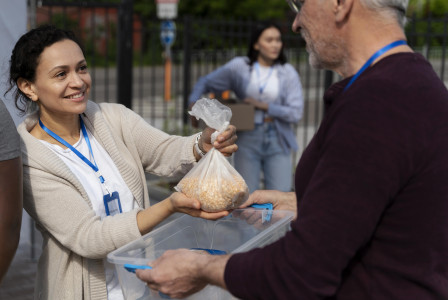Best practices
10 March 2025
Rediscovery Centre: National Centre for Circular Economy
Best practices
10 March 2025
Partnerships
Regenerative Green Transition
Skills
+5 more
-
31

The Rediscovery Centre (includes 4 Social Enterprises), serving as the National Centre for Circular Economy, has been at the forefront of steering Ireland towards a sustainable, low-carbon future since 2004. Nestled within Europe's pioneering circular economy demonstration center, it functions as an innovation hub. Its role encompasses imparting education, conducting research, facilitating policy development, engaging citizens, and fostering collaborative efforts to bolster community initiatives. Acknowledging that a just transition necessitates a societal shift, the center leverages its skills and expertise to ensure that all individuals can reap the benefits of and actively engage in the circular economy.
Topics
Ireland
International Organisations
NGOs / Non-profits
-
Thematic area
-
-
Partnerships
-
Regenerative Green Transition
-
Skills
-
-
Interlinkages with other sectors
-
-
Proximity and social economy
-
-
Action areas and keywords
-
-
Local Green Deals, green business communities and citizens’ initiatives
-
Reinforcing Business to Business collaboration for greener and circular value chains
-
-
Ecosystem focus
-
-
Social economy
-
-
Scope of activity
-
-
Regional
-
Share
Established in 2004 as a response to the social, economic, and environmental challenges faced by the Ballymun community in Dublin, Rediscovery Centre was supported by the Ballymun Regeneration Ltd., which was one of Europe's largest urban regeneration projects. The center emerged from a need to manage waste resources more effectively and transform waste into valuable assets. This included providing employment and training opportunities for residents.
Recognizing that the transformation of the community required a holistic approach, Rediscovery Centre focused on fostering social, economic, and environmental development. Public education was central to building community awareness and showcasing Ballymun as an environmental sustainability example. The center initiated pilot projects demonstrating excellence in waste prevention, reuse, and recycling. It also established social enterprises in furniture, fashion, and paint, contributing to the development of environmentally sustainable businesses and offering training and employment opportunities.
Over the years, Rediscovery Centre experienced significant growth and expansion. It became a trusted voice on the circular economy through investment in research, networking, and policy influence.
The refurbishment of the Boiler House in 2017 marked a turning point, centralizing operations and establishing the National Centre for the Circular Economy. The project exemplified building reuse, low-carbon construction, and sustainable development. The center played a role as an advocate for the circular economy, with research and policy departments growing to facilitate research and analysis. Initiatives like the Circular Economy Academy and nationwide education programs were launched to promote sustainability.
In the present day, Rediscovery Centre continues to set an example of best practices in the circular economy. Its social enterprises have expanded, offering services, training, and high-quality upcycled products to the local community and beyond.
IMPACT:
The Rediscovery Centre has generated significant, multi-dimensional impact by serving as a catalyst for sustainable urban development and the circular economy in Ireland:
The Centre’s innovative approach to waste management has transformed waste into valuable resources. Its pilot projects in waste prevention, reuse, and recycling have set benchmarks for circular practices and sustainable building reuse, as exemplified by the refurbishment of the Boiler House. By establishing social enterprises in sectors like furniture, fashion, and paint, the Centre has not only promoted environmentally sustainable businesses but also created vital employment and training opportunities, especially for local residents. Initiatives such as the Food Rescue Café and bicycle upcycling with Rothar demonstrate practical models that reduce waste, lower costs, and improve community well-being. The Centre has raised community awareness about sustainable practices. Its collaborative projects—ranging from surplus food management to accredited skills training for bike mechanics—have empowered individuals and provided replicable models for other communities. By developing comprehensive operational and training guides, the Centre has ensured that its best practices—whether in food waste reduction or upcycling—can be replicated and scaled across different regions. Its data-driven approach and emphasis on measurable outcomes lay the groundwork for broader application both nationally and internationally. Lastly, as Ireland’s National Centre for the Circular Economy, the Rediscovery Centre has become a trusted voice in shaping sustainability policy and research. Its strategic partnerships and extensive networking have amplified its influence, driving broader initiatives at the national level.
CHALLENGES AND LESSONS LEARNT:
Challenges:
Rediscovery Centre finds it challenging to continuously adjust to emerging environmental challenges and community needs proved demanding. In terms of stakeholder management, the biggest challenge is to balance the interests of various groups - residents, businesses, and policy makers - requiring effective coordination and ongoing communication. Lastly, ensuring that innovative pilot projects could be scaled and replicated across different contexts poses operational and financial challenges.
Lessons Learnt:
- A flexible, innovative approach is essential to respond to shifting community and environmental demands.
- Addressing social, economic, and environmental dimensions together is key to driving sustainable change.
- Building strong partnerships and engaging with the community leads to more robust, long-lasting outcomes.
- Investing in research and continuous evaluation enables better understanding and replication of successful practices.
Comments (0)
See also
Abacus: Education and Culture as Drivers of Social Change
- Categories
- Partnerships Regenerative Green Transition Skills +30 more
INCIEN – Accelerating Circular Economy Transitions in Central Europe
- Categories
- Partnerships Regenerative Green Transition Skills +24 more
Open Food Facts
- Categories
- Partnerships Regenerative Green Transition Skills +17 more




